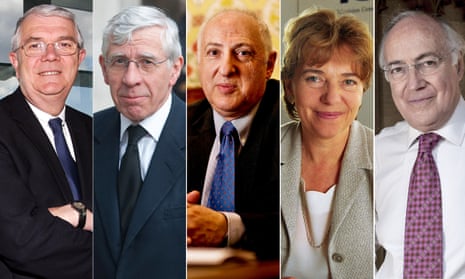The government-appointed body reviewing the Freedom of Information Act has held its first official briefing – but journalists were asked not to disclose who was there or attribute what they said.
Sources at the Independent Commission on Freedom of Information meeting disclosed that the cross-party group will consider introducing charges for applications for information for the first time.
But officials at the bizarre briefing in the Houses of Parliament asked journalists to keep it “off the record” and not quote the individuals present, despite requests to the contrary.
The meeting, attended by six journalists, was held by the commission to launch a public call for evidence after being set up in July by the Conservative minister Matthew Hancock to decide whether the act is too expensive and overly intrusive.
The committee has been heavily criticised for being an establishment “stitch-up” to neuter the work of journalists, campaigners and members of the public.
The five-member committee includes: Jack Straw, the former foreign secretary, who is already on the record calling for the act to be rewritten; Lord Carlile of Berriew, who accused the Guardian of “a criminal act” when it published stories using National Security Agency material leaked by Edward Snowden; Lord Howard, whose gardening expenses were criticised after being exposed following FoI requests; and Dame Patricia Hodgson, the deputy chair of Ofcom, which has criticised the act for its “chilling effect” on government.
It is chaired by Lord Burns, the former chair of Channel 4 and a former permanent secretary to the Treasury. Under the terms of the briefing, the Guardian cannot disclose which members of the committee, if any, were present.

At the briefing, sources close to the commission defended its members. “It was put together by the government. Members of the committee have been asked to be as open-minded as possible. They are distinguished in their field,” the source said.
It was conceded by the source that the commission’s members had not submitted requests for information. “What is true is that most people who are on the committee have been the subject of FoI requests rather than made FoI requests,” the source said.
“Our aim is to be as open as possible,” the source continued. However, the committee source could not explain why the committee itself was not open to FoI requests and declined requests to publish transcripts of its meetings.
Parties who wish to submit evidence with regards to the proposed charges for FoI requests have a deadline of 20 November to present their findings to the commission.
The source said he is confident that the commission can read all the evidence, discuss it, come to a conclusion, write a report, and print that report by the time parliament rises on 17 December, 20 working days after the deadline.
The source insisted that the commission has not come to any firm views and is open to go where the evidence leads. The source also said that Hodgson had “nothing to do” with Ofcom’s criticisms of the FoI act.
Both Labour and the Liberal Democrats have made clear that they are unhappy that Straw and Carlile chose to serve. Both parties have pointed out that they chose to take part in a personal capacity and are not representing the views of their parties, which both believe the act should remain as it is.
The commission on Friday issued invitations for submissions on a list of six questions including:
- “What protection should there be for information relating to the internal deliberations of public bodies?” and
- “Should the executive have a veto (subject to judicial review) over the release of information? If so, how should this operate and what safeguards are required?”
There is concern that charges could be as much as £20 per request. Campaigners said that when the Republic of Ireland introduced a €15 (£11) charge, the number of requests dropped by almost a half and led to criticism from the country’s Freedom of Information commissioner. The fee was eventually dropped – though there remains a cost for appealing against decisions.
Campaigners also fear that the commission could tighten rules stating that if a request from the public or the media takes a long time to process, it can be rejected on grounds of cost.
At present, anyone can ask for information so long as finding it does not cost more than £600 in the case of a government department, and £450 for another public body.
Maurice Frankel, director of the Campaign for Freedom of Information, said: “They are looking at a very wide range of potential restrictions to the act, making it harder to obtain internal discussions, new restrictions on access to cabinet material, possible restrictions on access to risk registers.”
On the possibility of charging for requests, Frankel said: “We would be very worried about that. For most people a single charge for a single request might not be a problem, except for people on low incomes.
“But the problem is that many people legitimately need to make more than a single request.
“It would make the act inaccessible for individual requesters and small and medium organisations as well as for freelance journalists.”

Comments (…)
Sign in or create your Guardian account to join the discussion